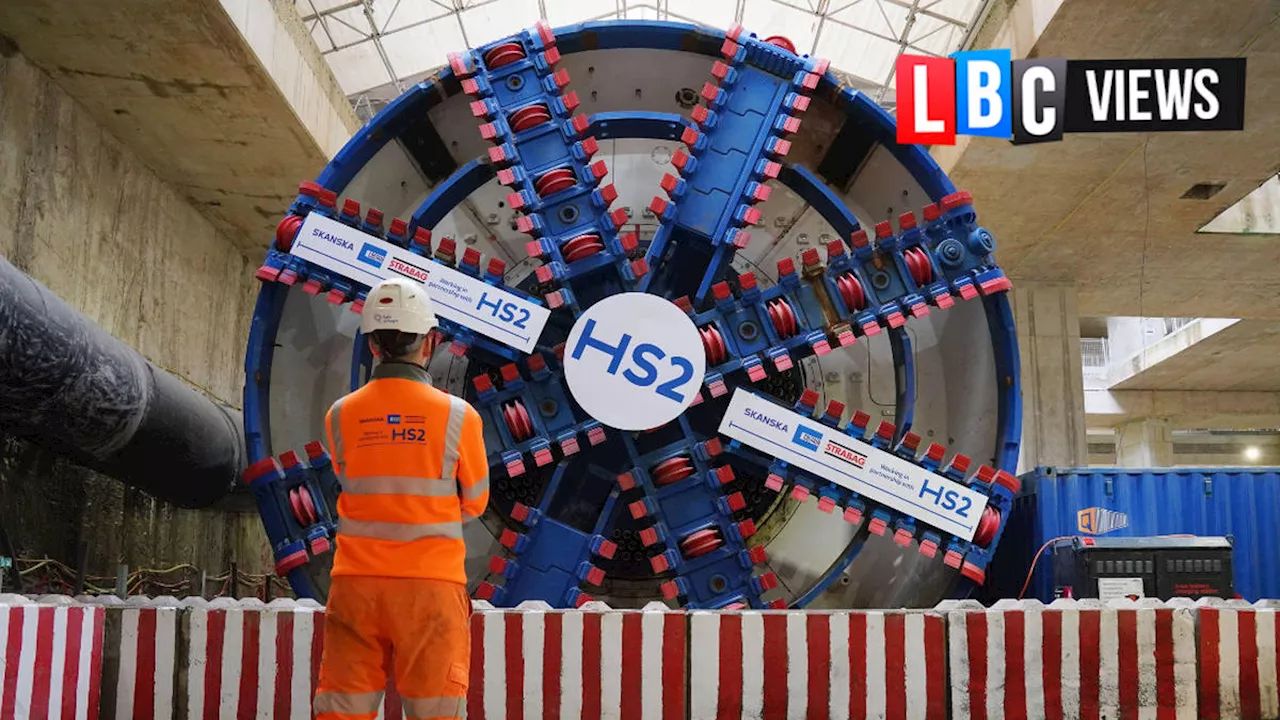Professor Jim Hall, President of the Institution of Civil Engineers, addresses the misconception that the UK is no longer capable of undertaking large-scale infrastructure projects. He highlights recent successes while acknowledging challenges like cost overruns and identifies key areas for improvement, emphasizing the need for a more integrated and needs-driven approach to infrastructure development.
As a civil engineer, I'm consistently saddened when asked why the UK doesn't build anymore, or whether it should accept that it's no longer a place for large infrastructure projects. Firstly, it's simply not true. Several significant projects have recently been completed or are currently underway. The Elizabeth line, HS2 , the Hinkley Point C nuclear reactor, and the 7.5GW of offshore wind turbines built in the past five years readily come to mind.
Of course, HS2 and Hinkley Point C have ultimately incurred significantly higher costs than initially projected. Instead of lamenting the UK's supposed inability to build, we should be focusing on understanding why projects often exceed their budgets. There are several factors contributing to this issue. One prominent challenge is the project-based approach we often adopt. We decide what to build before establishing the specific needs we aim to address. This can lead to the adoption of 'gold-plated' solutions without sufficient scrutiny. The initial design speed of HS2, 400 km/h, serves as a prime example of this tendency. Other hurdles include planning delays, unsuitable procurement practices, insufficient capacity within the supply chain, and uncertainty surrounding funding. However, this list is not exhaustive. While it's easy to become discouraged when projects encounter setbacks or overrun budgets, data suggests that the UK's performance in delivering large infrastructure projects is comparable to many other developed nations. Nevertheless, there are always avenues for improvement. Following the cancellation of the Northern leg of HS2, the Institution of Civil Engineers (ICE) identified five key lessons to enhance the delivery of all major infrastructure projects. In the Chancellor's January 29th speech, and the forthcoming Planning & Infrastructure Bill and 10-Year Infrastructure Strategy, the ICE anticipates witnessing a long-term vision and clear priorities for the UK. Increased certainty will instill the confidence necessary for investors and the construction supply chain to perceive the UK as an attractive destination for investment, construction, and infrastructure delivery. Clear objectives, grounded in identified needs, will also guide our decisions regarding what we build. If our aim is to facilitate better job opportunities, reduce emissions, and improve air quality, enhancing access to public transportation could be a solution that effectively addresses all these multifaceted needs. The National Infrastructure Commission, where I also serve as a commissioner, has initiated this crucial work by identifying infrastructure requirements in the second National Infrastructure Assessment. Moreover, existing tools, like the Construction Playbook, are explicitly designed to enhance efficiency and outcomes. Their implementation should be mandatory. The government has unequivocally stated its mission is growth, and strategic infrastructure projects can undoubtedly play a pivotal role in kick-starting and sustaining this growth. The UK possesses the requisite skills and engineering expertise to successfully deliver infrastructure. What hinders the country from realizing its ambitions is its fragmented approach, which can be rectified.
INFRASTRUCTURE ENGINEERING UK HS2 INVESTMENT GROWTH DELIVERY COSTS
United Kingdom Latest News, United Kingdom Headlines
Similar News:You can also read news stories similar to this one that we have collected from other news sources.
 UK Government Launches 'Build, Build, Build' Agenda, Facing Steep ChallengesPrime Minister Sir Keir Starmer has launched a major initiative aimed at accelerating development and infrastructure projects across the UK. However, the government faces significant hurdles in achieving its ambitious goals, including navigating complex legal and environmental regulations, addressing public concerns, and overcoming entrenched opposition from various interest groups.
UK Government Launches 'Build, Build, Build' Agenda, Facing Steep ChallengesPrime Minister Sir Keir Starmer has launched a major initiative aimed at accelerating development and infrastructure projects across the UK. However, the government faces significant hurdles in achieving its ambitious goals, including navigating complex legal and environmental regulations, addressing public concerns, and overcoming entrenched opposition from various interest groups.
Read more »
 Be bold and build: why the perception that Britain doesn't build is misguidedContrary to popular belief, Britain is building. We’re good at it and should be proud that some of the world's best and brightest engineers call Britain home.
Be bold and build: why the perception that Britain doesn't build is misguidedContrary to popular belief, Britain is building. We’re good at it and should be proud that some of the world's best and brightest engineers call Britain home.
Read more »
 What's going on in the markets and should we be worried?Sky News's Paul Kelso explains why borrowing costs are going up and why it matters.
What's going on in the markets and should we be worried?Sky News's Paul Kelso explains why borrowing costs are going up and why it matters.
Read more »
 Factorio Players Build 'God Factory' Producing 1 Million Science Per MinuteFactorio fans, known for their optimization skills, created the Eternity Cluster, a project that connected hundreds of players' factories using a mod to build a 'God Factory'. This system achieved an output of over 1,000,000 science per minute (SPM), surpassing the typical player's need for 30-40 SPM to complete the game.
Factorio Players Build 'God Factory' Producing 1 Million Science Per MinuteFactorio fans, known for their optimization skills, created the Eternity Cluster, a project that connected hundreds of players' factories using a mod to build a 'God Factory'. This system achieved an output of over 1,000,000 science per minute (SPM), surpassing the typical player's need for 30-40 SPM to complete the game.
Read more »
 Evicted Mother Urges Government to Build Homes on Vacant Belfast SiteMarwa Basi, a single mother of four who was recently evicted in Belfast, is pleading with the government to build housing on the city's largest publicly owned vacant site. Basi and her children are currently living on Northern Ireland's north coast and facing daily five-hour round trips for school and training. A campaign group, Take Back The City, claims Basi represents thousands on the waiting list for housing in West Belfast while the 25-acre former Mackie's factory site remains unused. They propose 800 homes and business space on the site. While the site's former factory has been replaced by a greenway, the rest of the land is zoned for industry. The group has presented their master plan to various government officials, but Basi urges the council to support their plans.
Evicted Mother Urges Government to Build Homes on Vacant Belfast SiteMarwa Basi, a single mother of four who was recently evicted in Belfast, is pleading with the government to build housing on the city's largest publicly owned vacant site. Basi and her children are currently living on Northern Ireland's north coast and facing daily five-hour round trips for school and training. A campaign group, Take Back The City, claims Basi represents thousands on the waiting list for housing in West Belfast while the 25-acre former Mackie's factory site remains unused. They propose 800 homes and business space on the site. While the site's former factory has been replaced by a greenway, the rest of the land is zoned for industry. The group has presented their master plan to various government officials, but Basi urges the council to support their plans.
Read more »
 Teen Boxer and Entrepreneur Overcomes Cancer to Build Property EmpireKaine Harris, a 16-year-old boxing prodigy and budding entrepreneur, has defied the odds by overcoming cancer and establishing himself as a successful property investor. Despite his young age, Kaine has already earned a substantial £14,500 in just three months by identifying lucrative property deals for wealthy clients.
Teen Boxer and Entrepreneur Overcomes Cancer to Build Property EmpireKaine Harris, a 16-year-old boxing prodigy and budding entrepreneur, has defied the odds by overcoming cancer and establishing himself as a successful property investor. Despite his young age, Kaine has already earned a substantial £14,500 in just three months by identifying lucrative property deals for wealthy clients.
Read more »
